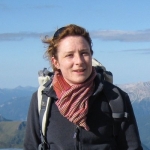The mountain all to himself
Saint-Colomban-des-Villards, France -- The idea was to really soak in the atmosphere and get the details that you often miss when you do a story on deadline. To take the time and take in the scenery, the noise, the smells. To give a real feel of the place. A sheep herder with an alpine mountain all to himself.
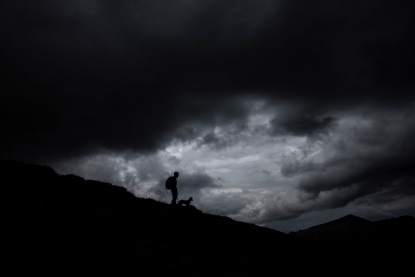 (AFP / Jeff Pachoud)
(AFP / Jeff Pachoud)Working for a news agency, you rarely get the opportunity to take your time with stories. But this was summer and, being outdoorsy types, we were more than willing to spend at least two full days, but more if needed, in the wilderness of the Alps.
For a long time, my photographer colleague Jeff had wanted to capture an entire season on the mountain with a sheep herder, from June to end of October. We asked the agriculture ministry for a list of herders who had just finished their training in agricultural school. We eventually settled on Gaetan in the southern French Alps.
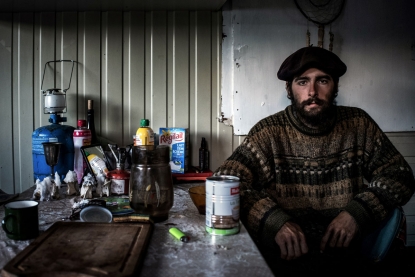 (AFP / Jeff Pachoud)
(AFP / Jeff Pachoud)Jeff first met Gaetan in the spring, when some 1,300 sheep were transported from their breeders in southern France and released in the mountains below the Glandon Pass, east of the city of Grenoble, and the two agreed that we would join him in late August, once he was well settled up in the hills.
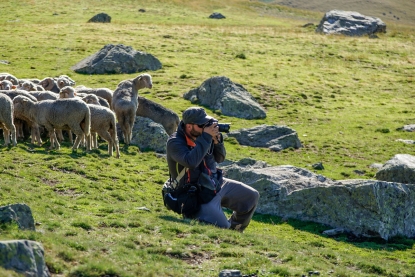 Photographer Jeff Pachoud in action. (Photo courtesy of Gersende Rambourg)
Photographer Jeff Pachoud in action. (Photo courtesy of Gersende Rambourg)We parked our car, hauled out our stuffed backpacks and started up the hiking trail toward Gaetan’s hut. Loaded like donkeys -- sleeping bags, enough food for days, Jeff’s photo equipment, wine for our host -- we climbed for a good hour before we reached our destination.
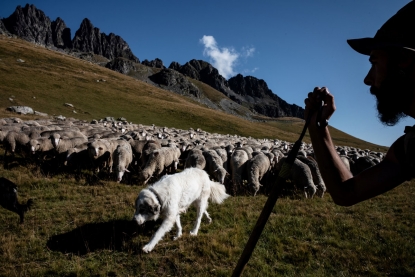 (AFP / Jeff Pachoud)
(AFP / Jeff Pachoud)Gaetan, with his black goatee and his beret, came out to greet us. “Did you see us coming?” we asked. “No, I felt it,” he answered. Taking advantage of his short absence, his sheep dispersed along the steep slope covered in low blueberry shrubs. “Bitches,” Gaetan muttered setting off after them.
We put down out backpacks and set off after him down the slope. We chatted for awhile before he finally turned off his transistor radio. “I get great reception here,” he told us. “I listen to public radio all day.” It keeps him company.
For the next few hours we followed Gaetan as he meandered up and down the verdant slopes. He would often sit, staring into the distance, seemingly lost in the scenery. And then would start racing when the herd was done eating in one spot and moved to another.
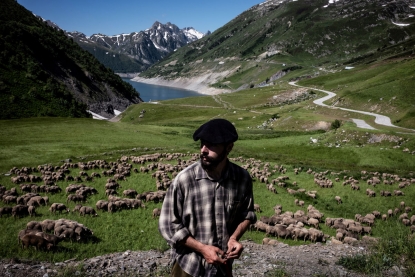 (AFP / Jeff Pachoud)
(AFP / Jeff Pachoud)A few hours later a sheep fractured its leg after it got caught in scree. Gaetan told us that this was the most excitement he’d likely see in a month. The animal was in a panic. Gaetan made a makeshift splint for it.
He firmly immobilized the sheep and the animal became docile. There was panic in its eys and you could tell it was in pain. But to an outsider like me, it seemed the sheep trusted Gaetan to know what he was doing.
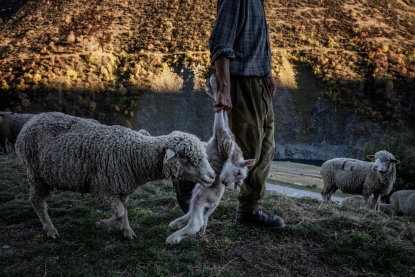 (AFP / Jeff Pachoud)
(AFP / Jeff Pachoud)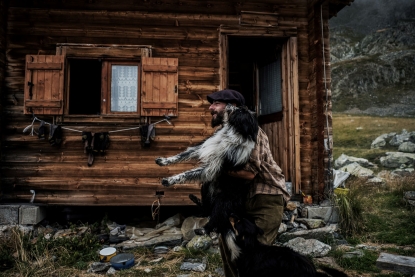 (AFP / Jeff Pachoud)
(AFP / Jeff Pachoud)
We left it to rest and ambled after the herd as it looked for virgin grass to nibble.
“You have to make the sheep think that they are free all the while containing them,” Gaetan told us. I soon saw what he meant. We went around in circles, we climbed, we descended to the animals’ rhythm. After a while it made you dizzy, this endless wandering. It ran completely counter to what we were normally used to, which was to have a goal of a summit or a pass. Jeff and I were both in decent shape -- I’d just completed a climbing course at altitude on a glacier and both Jeff and I were good hikers -- but this meandering got to us after a while.
So we were both relieved when at the end of the day we finally returned to Gaetan’s hut. The animals slowly filed into their enclosure nearby, where they spend their nights. Gaetan heated up some water, poured it into a thermos, and headed back down the slope, to the wounded sheep to make it a proper cast. We ran after him. Once the cast was done, we hiked back up to the hut again, exhausted. Two weeks later we’d learn that the effort had been for naught -- with its mobility reduced, the sheep fell prey to a wolf.
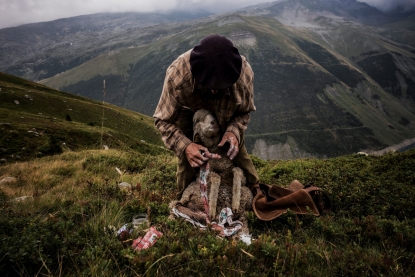 (AFP / Jeff Pachoud)
(AFP / Jeff Pachoud)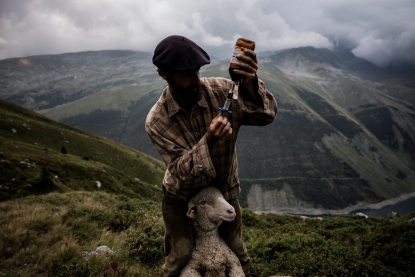 (AFP / Jeff Pachoud)
(AFP / Jeff Pachoud)
It was nearly dark out. The rare hikers and climbers whom we ran into during the day had now gone. We had the mountain to ourselves.
Gaetan began to cook dinner. He picked some radishes that he planted at the start of the season and offered them to us. We dusted the dirt off them and dug in. They were small but very tasty. He made a fire inside an “oven” that he made from a few big rocks. He cut wood with an axe. Once the oven was hot, he stuffed a homemade blueberry pie inside. Jeff and I, a glass of wine in our hands, watched the alpenglow light up the peaks around us and eventually disappear.
He served us up our dinner -- short pasta mixed with cream, bacon bits, cheese and onions. It tasted heavenly. Food always tastes so much better when eaten in the mountains, at the end of a long day of walking or climbing.
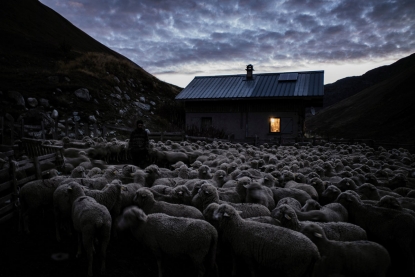 (AFP / Jeff Pachoud)
(AFP / Jeff Pachoud)A bit further up the slopes there was a makeshift sink full of water -- glacier water that poured down into it via pipes that Gaetan put together. He kept the water in large containers on the side of his hut. The sun warmed it and on those days that he washed, he had hot water. “Sometimes hikers pass at the precise moment when I’m washing,” he said, smiling. “Too bad for them.” He had also built himself a toilet of sorts -- a board with a hole perched above a bucket.
We climbed into the hut, where we slept next to each other, like in a mountain refugee. End of our first day with Gaetan.
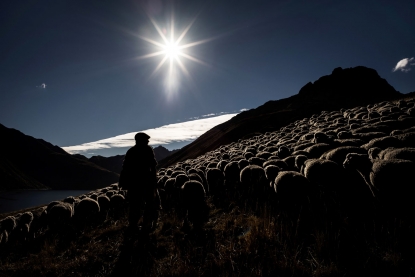 (AFP / Jeff Pachoud)
(AFP / Jeff Pachoud)The next morning we got up at 6:30. A few cups of coffee later, we helped Gaetan give salt to the sheep (gets their appetite going for the day). The day was hot and we lazily followed the sheep up and down the slope again.
The air was heavy. At 3 pm the sky couldn’t take anymore and exploded into a wicked thunderstorm. We took shelter in a cave, eating some chocolate as we waited for the storm to pass.
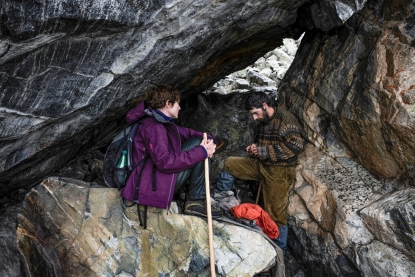 The author (left) and Gaetan take shelter. (AFP / Jeff Pachoud)
The author (left) and Gaetan take shelter. (AFP / Jeff Pachoud)We couldn’t even see the sheep anymore behind the sheets of falling rain.
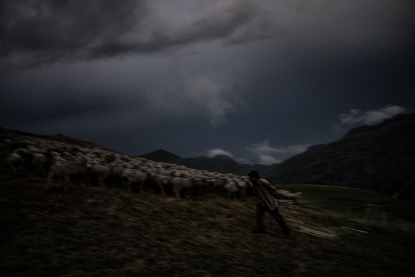 (AFP / Jeff Pachoud)
(AFP / Jeff Pachoud)We watched, mesmerized, as the light changed on the mountain and on the lake below us.
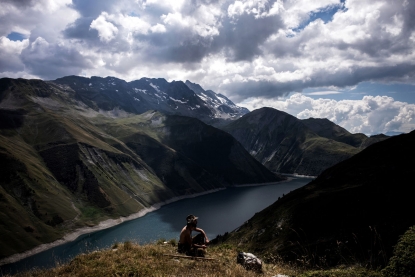 (AFP / Jeff Pachoud)
(AFP / Jeff Pachoud)We left Gaetan the next day. We said our good-byes and took off down the slope, leaving him alone with his sheep. Once again, he had the mountain all to himself.
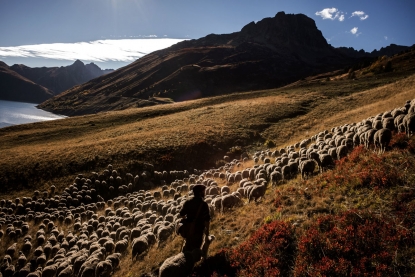 (AFP / Jeff Pachoud)
(AFP / Jeff Pachoud)


